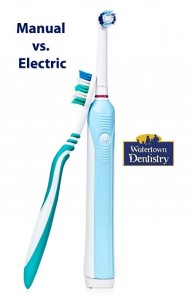Brushing is critical to overall dental care. Since its invention in the 1930s, the toothbrush has evolved extensively to meet consumer preference. In the 1990s, the use of electric toothbrushes grew in popularity compared to the more traditional manual form of brushing.
There are many who believe that manual brushing is more effective while others feel that electric brushes have more to  offer in dental care. So which is the right way to brush your teeth? In this blog, we discuss the pros and cons associated with manual and electric brushing.
offer in dental care. So which is the right way to brush your teeth? In this blog, we discuss the pros and cons associated with manual and electric brushing.
What are the Benefits and Drawbacks of Manual Brushing?
There are several options to choose from in the manual toothbrush category. Manual brushing offers the following advantages:
- Manual brushes come in nearly every shape and size imaginable. So no matter the situation, you’re almost certain to find a toothbrush to suit your needs.
- Manual brushes are easy to maintain. There’s no batteries or charging, which makes them the perfect “anytime brush”.
- It’s difficult to beat manual toothbrush pricing. In fact, many dentists will offer toothbrushes free to their clients.
But there are some drawbacks to a manual toothbrush, namely:
- They require ample dexterity and physical exertion. So they’re not suitable for everyone.
- Since manual brushes don’t have built-in timers, it’s easy to fall far short of the two-minute brushing time that most dentists recommend.
Now that you know the pros and cons of manual brushing, here are the pluses and minuses of using an electric toothbrush.
What are the Pros and Cons of Electric Brushing?
Despite knowing the importance of brushing, children and adults alike find it dull and boring. Electric brushes help make brushing much more exciting. Here are a few more advantages:
- Electric toothbrushes are easy to use. The electric technology does most of the work for you.
- You can achieve great results with an electric toothbrush. In fact, there are many studies that indicate that electric brushes remove more plaque and bacteria than manual toothbrushes. Additionally, the built-in timers can help users ensure that you spend the right amount of time cleaning your teeth.
But just like manual toothbrushes, electric toothbrushes have several disadvantages:
- These brushes require charging or a continuous investment in batteries. Without power, your electric toothbrush loses its functionality.
- Electrical toothbrushes are costly. Additionally, their electrical parts make them much more delicate to the extent that a simple fall can render your electric toothbrush inoperable.
The bottom line is that whether manual or electric – there is no right or wrong way to brush your teeth. As you can see, each option comes with several pros and cons. Whatever your choice, the key is to ensure that you devote quality time to brushing twice a day.
- Learn more about Dental Care
Call us for more information (617) 600-3442
or
